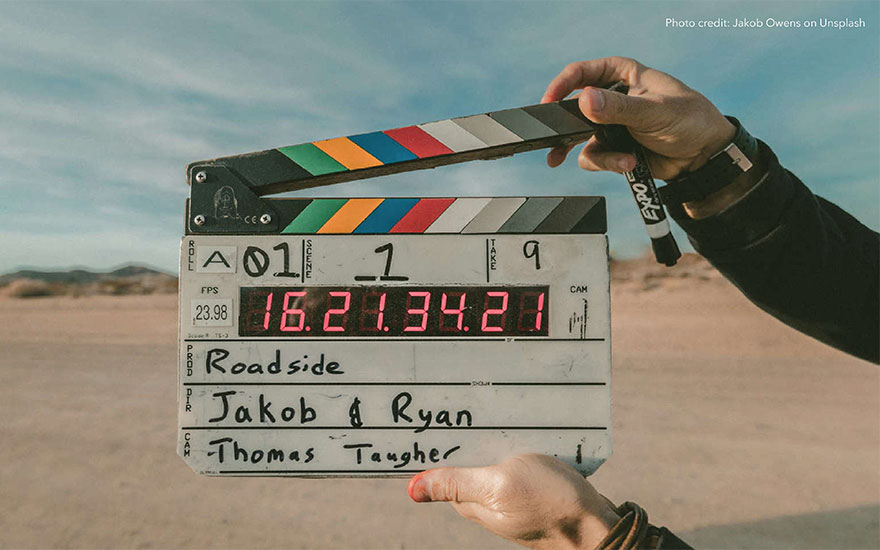We talk to screenwriter Dirk Blackman about navigating the film industry in this CineSparks webinar
In our CineSparks Webinar Series, we’ve talked to people working across the cinema industry, from exhibition to screenwriting, about their roles, trends in their industries, and tips for those who are just starting or early in their careers.
Christie’s Scott Kennard spoke with Dirk Blackman, writer of “Outlander” and “Underworld: Rise of the Lycans”, about his experience in Hollywood and the best (and worst) ways to establish and maintain your space in the cinema industry. This is an abridged and condensed version of the lively conversation between Dirk and Scott. Watch the video below for the full conversation.
Watch the video
Dirk Blackman, in conversation with Christie’s Scott Kennard, details his experiences of success and adaptation in Hollywood.
Scott Kennard (SK): You’ve been writing and teaching for your entire career. What are your thoughts on the current landscape of cinema, especially for up-and-comers?
Dirk Blackman (DB): Chaos. It's like the wild west out there! I think you've got a lot of masters of the Universe running the studios who seemingly know nothing.
I mean, they do things, and sometimes you have no idea why they're doing it. I think they're just reacting constantly. When I started, it was film first, then it was television. Now it's streaming first, and then film. IPs were important, but now, you have to have IPs.
SK: You have to have that IP to grow from, right?
DB: Yeah…it was the security blanket of “I've got an IP." Since somebody else valued it, I could value it and, therefore, save my job. But I think for me, the one constant I get is that people want to be told stories. It's what they want, and they need people to tell those stories to them.
My advice – don't wait for studios to notice you. If you want to make something, you've got a studio in your pocket. Go make a YouTube short. Go make a TikTok. Make things because people tell you that you've got to create your own brand.
I think the most important brand for yourself is you're the person who gets things made. That's the number one brand you want. Put yourself out there as an actual creator, not somebody who waits for things to happen to them.
How to get representation for my screenplay
SK: So now to that very important question, I have a great screenplay. How do I get representation?
DB: This is what everybody asks, and here's the problem. There's no magic bullet. You need a war plan, and you need the dedication to carry it through.
So first off, you don't want an agent right now; you want a manager. A manager will help you get the agent. It's a little bit easier to get a manager than it is to get an agent. They're casting a wider net, and they're the ones who tend to act as funnels to get people an agent.
But like I said, this is not a magic bullet, so you've got to think about a few things. Don't be shy. Keep at it, enter your contests. And a small thing, do send your best work. I don't mean you should frame every single paragraph but do send your best stuff.
Obviously, network. That is probably the most important thing. When I graduated AFI, American Film Institute, the dean said it's going to take you five years. And I sold my first thing five years after I graduated, to the day.
And there are two things that happened during those five years. One, you're getting good enough to be represented because you're working. And you're meeting the people who are going to help you get represented.
I think about this because a lot of my students, because they're writers, like to spend time in their caves…you have to get past being shy. You have to meet people. They can be your cohort. If you happen to go to film school, they can be the people in your year and above. But you've got to create your network because you need the person who's working at a production company as an assistant to say, “Hey, dude, remember we played volleyball on the beach? Now read my script.”
SK: One of the greatest pieces of advice that you taught me throughout the years, both professionally and personally, is how to apply the note beneath the note [in screenwriting]. I was hoping that you could give that wonderful tidbit of information to this group.
DB: So the note beneath the note, what is it? Like you said, you get a note – pretend it's the worst note on Earth. And you look at that note, and you're like, “I think I'd rather die than do this note.” Or this note will unravel everything I've done and maybe destroy other scripts. And you dismiss it, or you do it without understanding it, and it doesn't work.
You say to yourself, “OK, that's an incredibly bad note. But why did they give you that note?” That is, what were they sensing underneath when they read your material? What was the problem that they just gave you an answer to? If you query that, you can hopefully land on what's wrong.
How AI is changing the cinema industry
SK: So my final question is, how do you foresee the industry changing in the coming years, especially as our CineSparks webinar audience gears up for careers in the same field where you've spent a lifetime? What do they need to consider about the future of cinema?
DB: I'm going to just go with the one mutant elephant in the room, which is AI, and then I'll get someplace that's not quite so bad.
There's certainly going to be a period where the studios are going to use it [AI] to trim jobs. They're servicing multinational masters, so they have to keep the profit margins going.
Studios know how to make art because they have the money. But what if we don't need them? For example, I've got a pilot, and studios, either they're not going to read it or they don't like it.
But what if AI is actually asymmetric warfare, a force multiplier for us? What if creatives can use AI to make things without the studios? And if it’s good, people will watch it. We can put it out on YouTube or whatever platform of the future there is and completely bypass them.
SK: Which goes back to what you said in the original question of what we can do to get ourselves out there.
DB: Yes. Do not wait for the studios to notice you. If you do something good, they will notice you.
For more screenwriting war stories, learn more about Dirk’s upcoming book “What the F*** Was I Thinking: A How-Not-To For Screenwriters,” at www.wtfwasithinking.net



